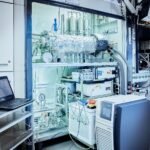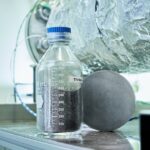- Hydrogen system laboratory used for the characterisation and coupling ofto characterize and coupling a hydrogen storage system with a fuel cell or electrolysis system.
- A metal hydride alloy based on titanium-iron-manganese in loose powder form and as a pressed pellet.
A significant challenge for the successful implementation of hydrogen technology is hydrogen storage. At the chair of Applied Materials Engineering, we would like to contribute to the development of technically efficient, safe, and economically viable solutions. Therefore, we are working on scientific issues for mobile and stationary hydrogen storage systems based on metal hydrides and their integration into existing application structures. This research is characterized by its high level of interdisciplinary nature in the fields of material engineering, physical chemistry, plant engineering, process engineering, and economics, among others, and includes actual experimental work on a laboratory scale and the collection of data from actual setups of test plants, including safety concepts. With our research, we try to bridge the gap between basic material and alloy development and the concrete application in passenger cars, ships, or in the context of sector coupling and thus gain a scientific understanding of the related issues in the upscaling from laboratory to prototype scale. This experimental work is complemented by computer-based simulation (digital twin) on a component (finite element methods and multiphysics simulations) and system-level (system simulation).
Our research aims to gain a deeper scientific understanding of materials and processes in the field of hydrogen storage and link this knowledge to the behavior of the overall system. By studying the interaction of in-situ experiments and simulations across the entire value chain, it should be possible to conclude directly from the desired application to the required material characteristics and storage design.
Letzte Änderung: 26. July 2022

